Travel and Tourism Sector Analysis Project
VerifiedAdded on 2019/12/17
|16
|3834
|244
Project
AI Summary
This project report provides a comprehensive analysis of the travel and tourism sector, covering its historical development, demand and supply factors, and the impact of various elements such as economic, social, and environmental factors. It also explores the influence of political changes on the industry and examines strategies for maximizing positive impacts while minimizing negative ones. The report focuses on the TUI group and its operations in Greece and Turkey, offering insights into how the company can optimize its strategies to meet demand and ensure sustainable growth. The project concludes with a discussion of the importance of travel and tourism for economic development and cultural exchange.
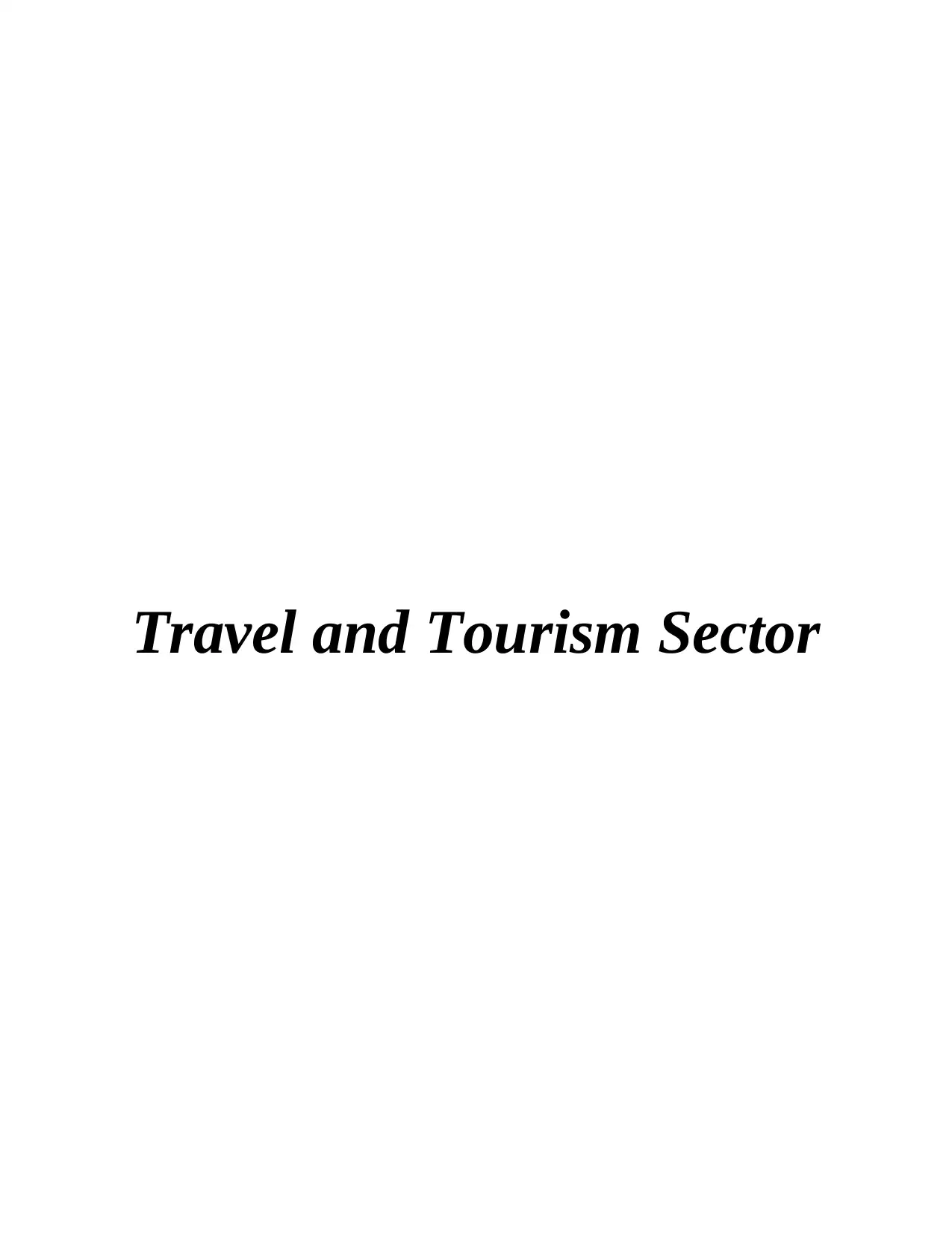
Travel and Tourism Sector
Secure Best Marks with AI Grader
Need help grading? Try our AI Grader for instant feedback on your assignments.
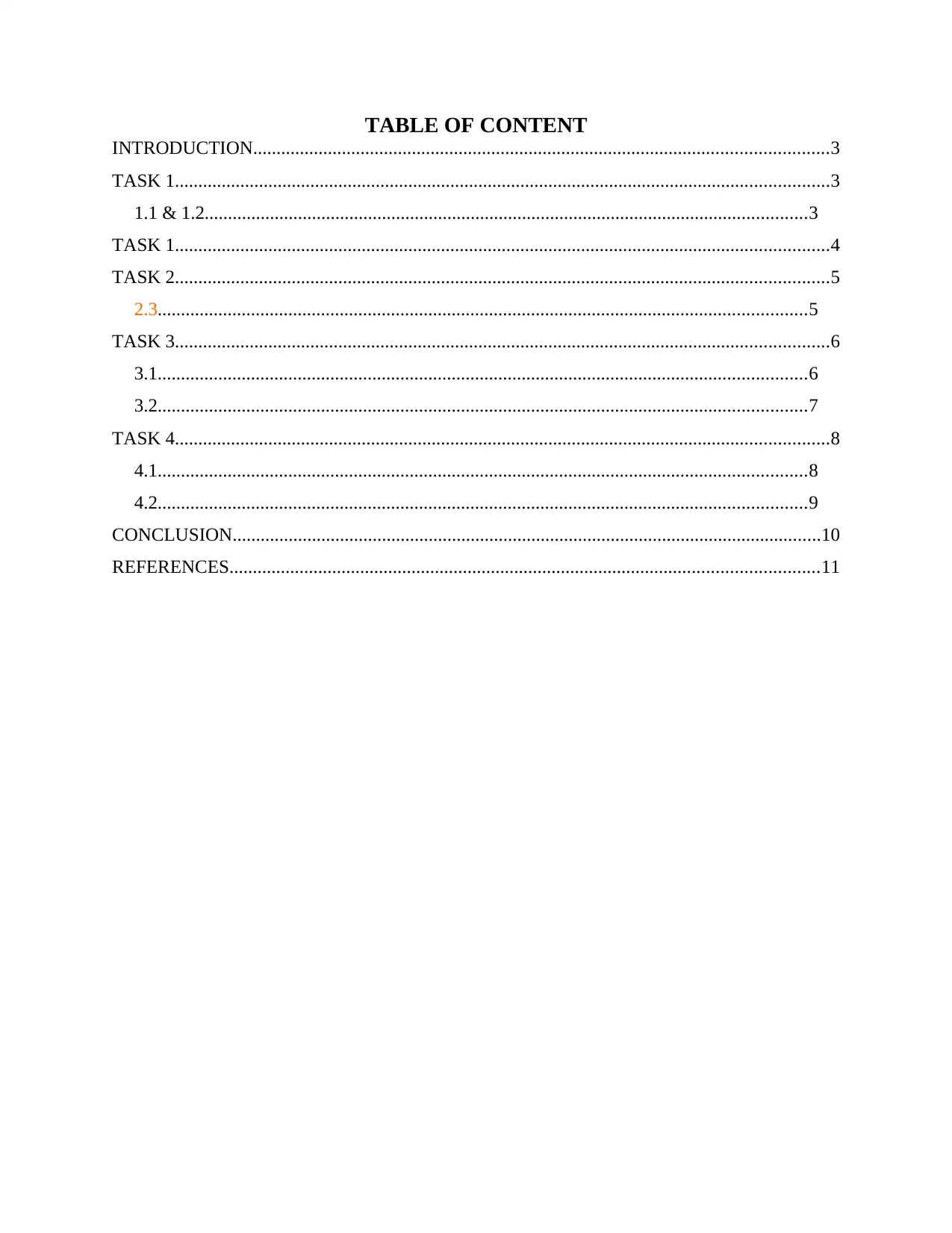
TABLE OF CONTENT
INTRODUCTION...........................................................................................................................3
TASK 1............................................................................................................................................3
1.1 & 1.2.................................................................................................................................3
TASK 1............................................................................................................................................4
TASK 2............................................................................................................................................5
2.3...........................................................................................................................................5
TASK 3............................................................................................................................................6
3.1...........................................................................................................................................6
3.2...........................................................................................................................................7
TASK 4............................................................................................................................................8
4.1...........................................................................................................................................8
4.2...........................................................................................................................................9
CONCLUSION..............................................................................................................................10
REFERENCES..............................................................................................................................11
INTRODUCTION...........................................................................................................................3
TASK 1............................................................................................................................................3
1.1 & 1.2.................................................................................................................................3
TASK 1............................................................................................................................................4
TASK 2............................................................................................................................................5
2.3...........................................................................................................................................5
TASK 3............................................................................................................................................6
3.1...........................................................................................................................................6
3.2...........................................................................................................................................7
TASK 4............................................................................................................................................8
4.1...........................................................................................................................................8
4.2...........................................................................................................................................9
CONCLUSION..............................................................................................................................10
REFERENCES..............................................................................................................................11
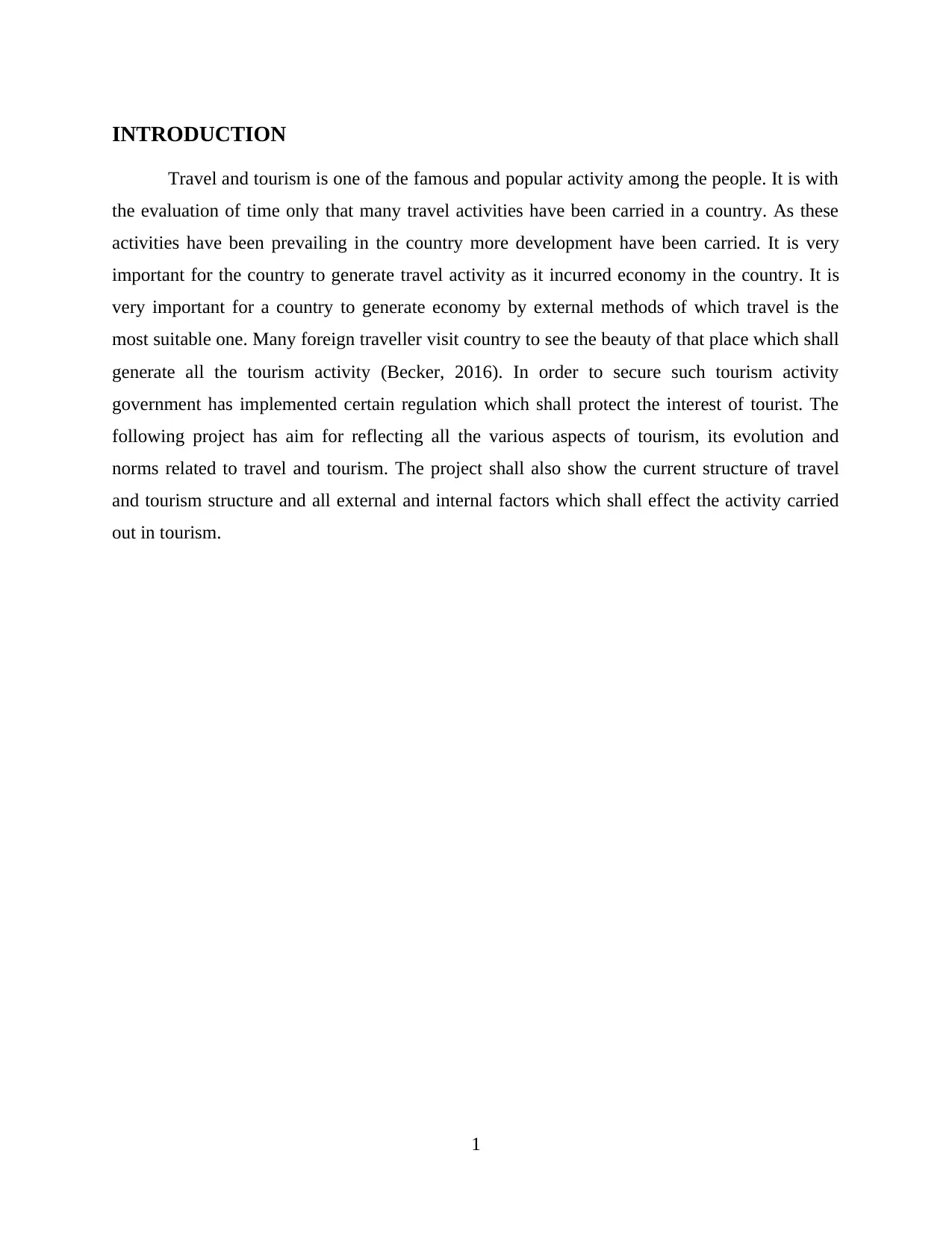
INTRODUCTION
Travel and tourism is one of the famous and popular activity among the people. It is with
the evaluation of time only that many travel activities have been carried in a country. As these
activities have been prevailing in the country more development have been carried. It is very
important for the country to generate travel activity as it incurred economy in the country. It is
very important for a country to generate economy by external methods of which travel is the
most suitable one. Many foreign traveller visit country to see the beauty of that place which shall
generate all the tourism activity (Becker, 2016). In order to secure such tourism activity
government has implemented certain regulation which shall protect the interest of tourist. The
following project has aim for reflecting all the various aspects of tourism, its evolution and
norms related to travel and tourism. The project shall also show the current structure of travel
and tourism structure and all external and internal factors which shall effect the activity carried
out in tourism.
1
Travel and tourism is one of the famous and popular activity among the people. It is with
the evaluation of time only that many travel activities have been carried in a country. As these
activities have been prevailing in the country more development have been carried. It is very
important for the country to generate travel activity as it incurred economy in the country. It is
very important for a country to generate economy by external methods of which travel is the
most suitable one. Many foreign traveller visit country to see the beauty of that place which shall
generate all the tourism activity (Becker, 2016). In order to secure such tourism activity
government has implemented certain regulation which shall protect the interest of tourist. The
following project has aim for reflecting all the various aspects of tourism, its evolution and
norms related to travel and tourism. The project shall also show the current structure of travel
and tourism structure and all external and internal factors which shall effect the activity carried
out in tourism.
1
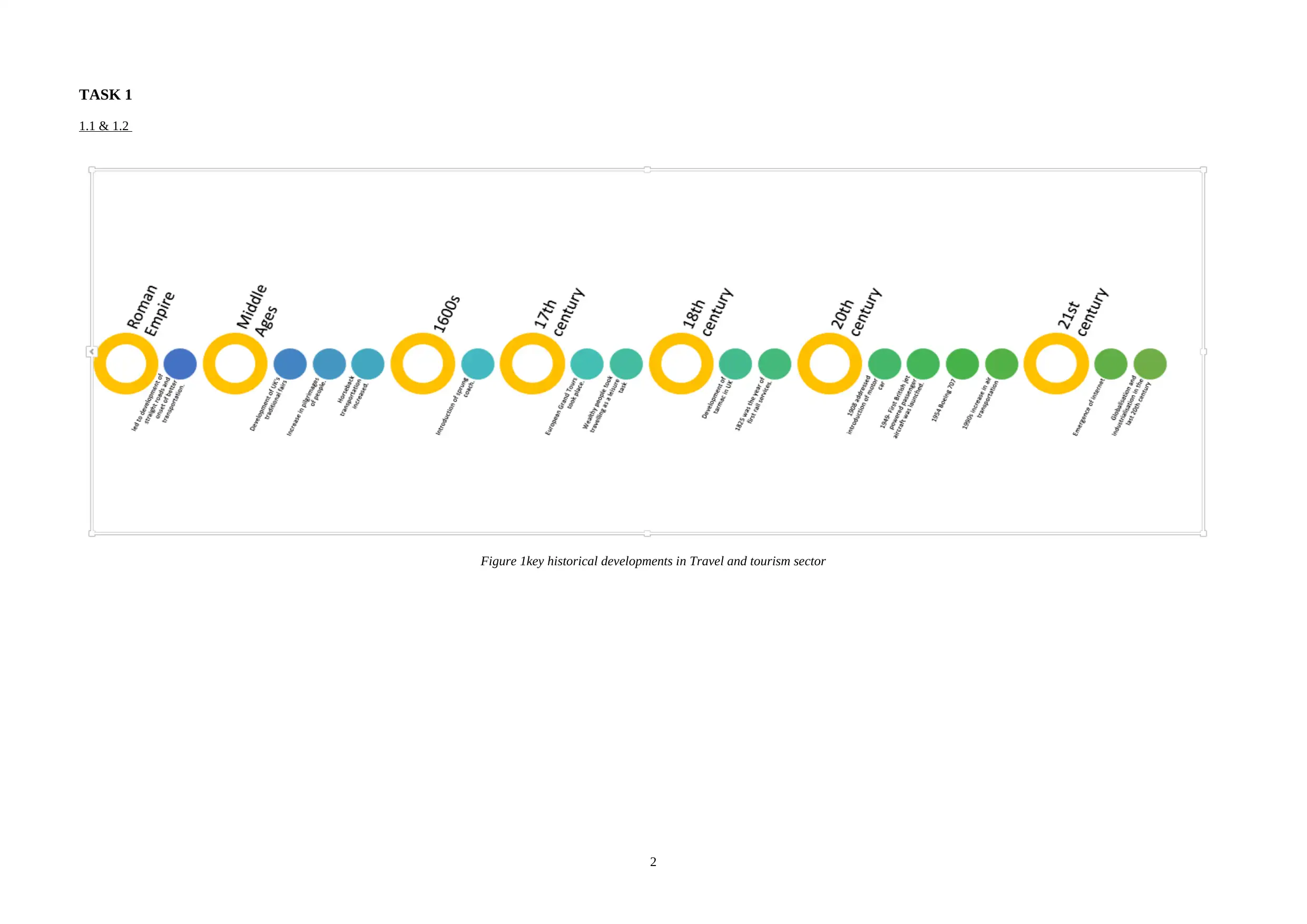
TASK 1
1.1 & 1.2
Figure 1key historical developments in Travel and tourism sector
2
1.1 & 1.2
Figure 1key historical developments in Travel and tourism sector
2
Secure Best Marks with AI Grader
Need help grading? Try our AI Grader for instant feedback on your assignments.
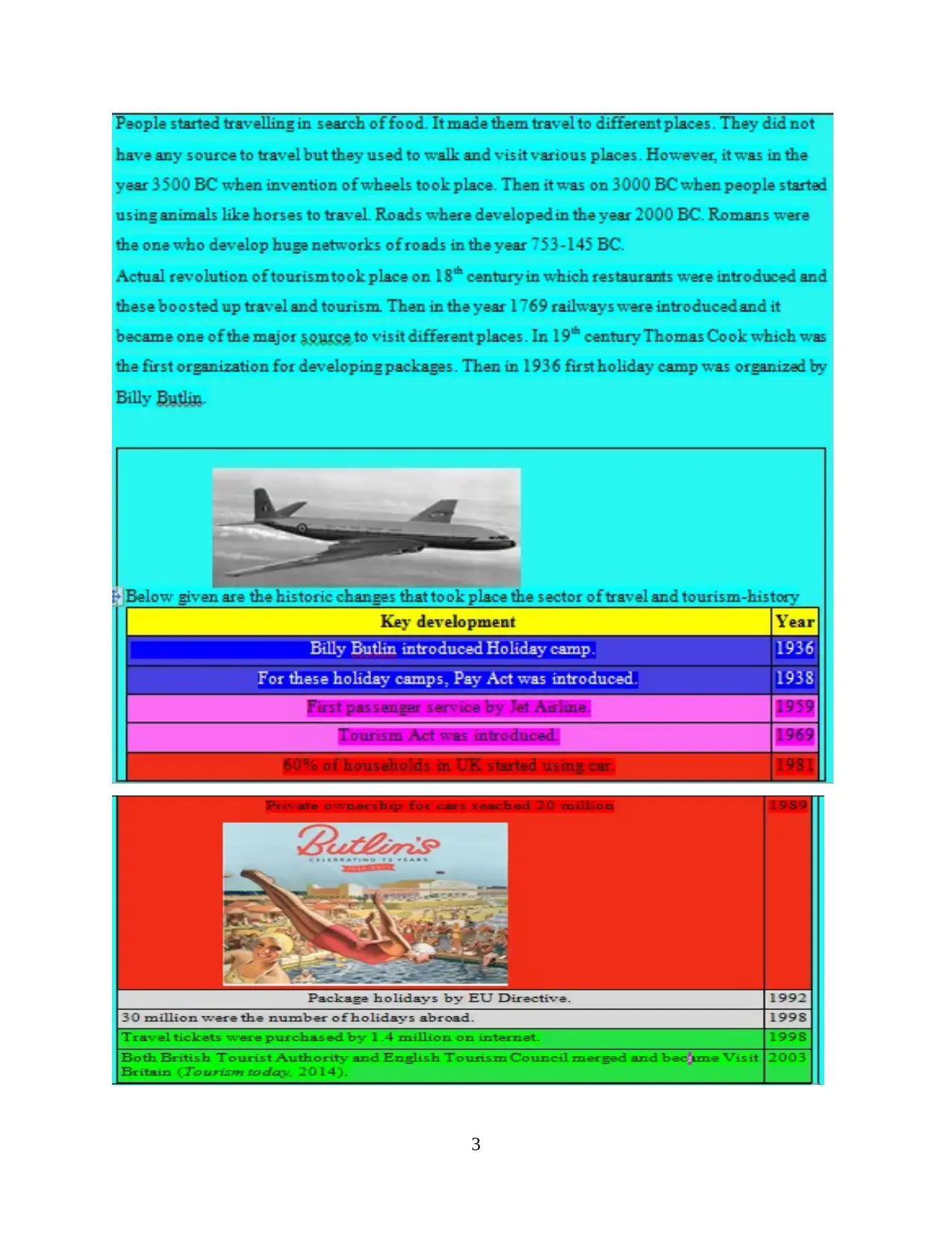
3
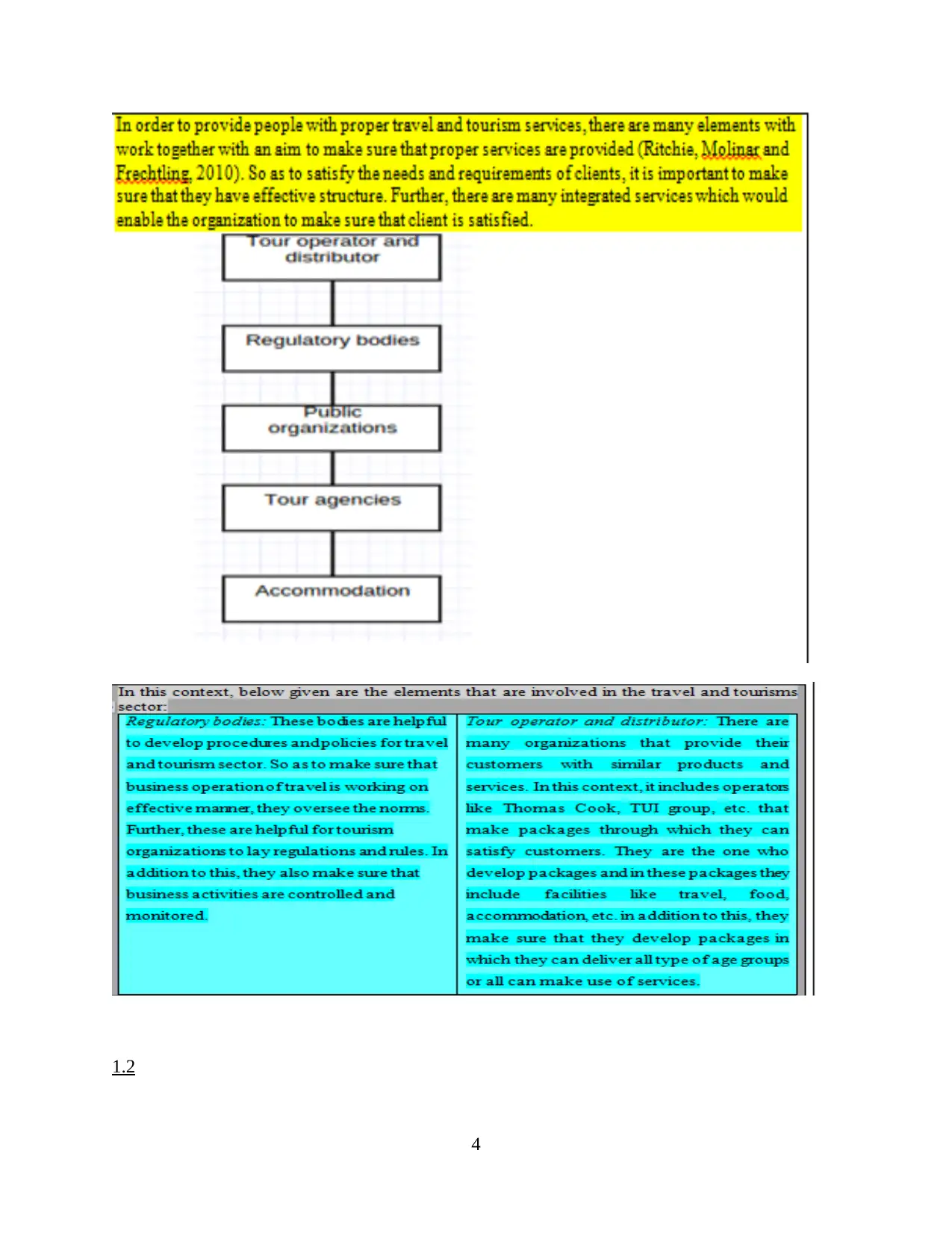
1.2
4
4
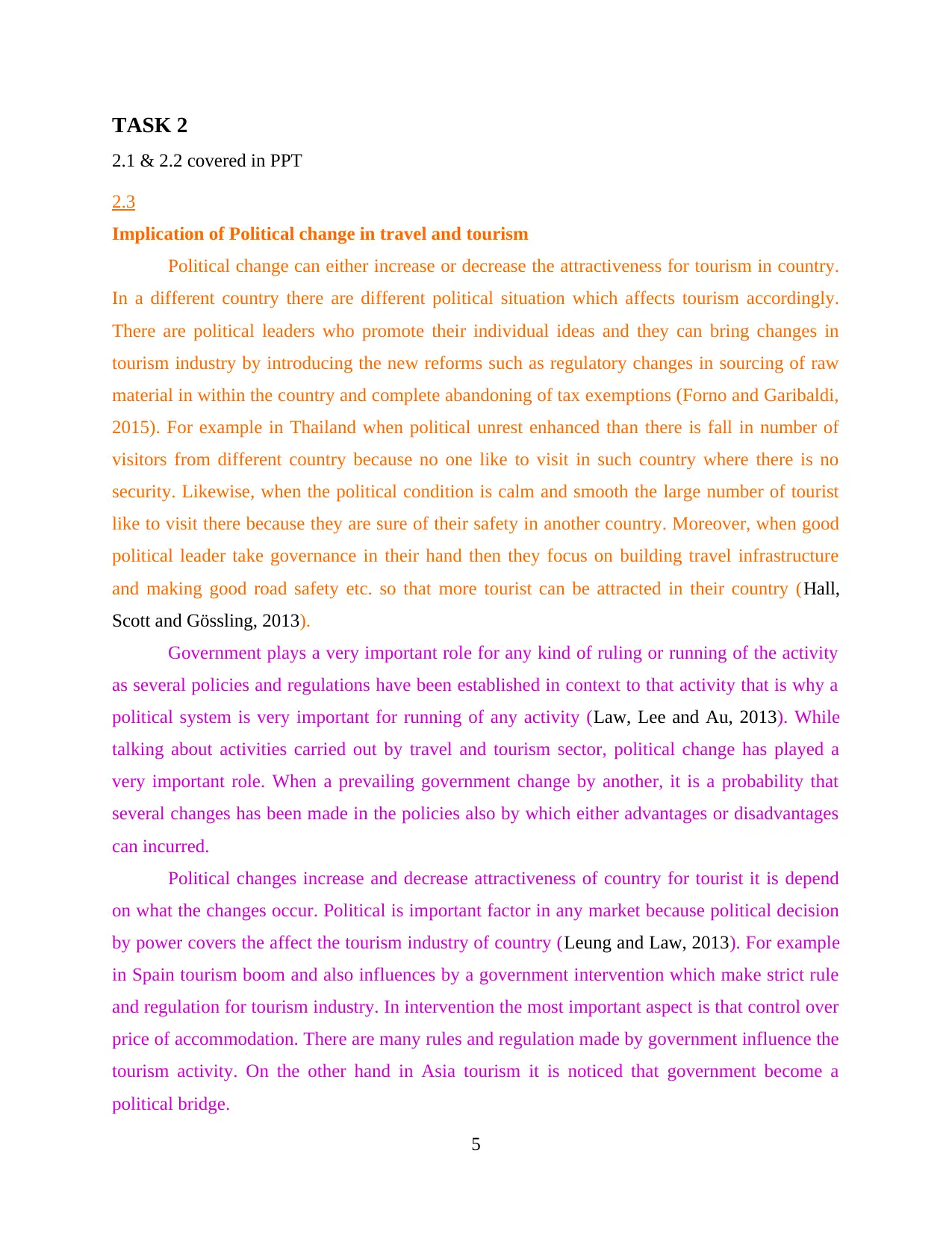
TASK 2
2.1 & 2.2 covered in PPT
2.3
Implication of Political change in travel and tourism
Political change can either increase or decrease the attractiveness for tourism in country.
In a different country there are different political situation which affects tourism accordingly.
There are political leaders who promote their individual ideas and they can bring changes in
tourism industry by introducing the new reforms such as regulatory changes in sourcing of raw
material in within the country and complete abandoning of tax exemptions (Forno and Garibaldi,
2015). For example in Thailand when political unrest enhanced than there is fall in number of
visitors from different country because no one like to visit in such country where there is no
security. Likewise, when the political condition is calm and smooth the large number of tourist
like to visit there because they are sure of their safety in another country. Moreover, when good
political leader take governance in their hand then they focus on building travel infrastructure
and making good road safety etc. so that more tourist can be attracted in their country (Hall,
Scott and Gössling, 2013).
Government plays a very important role for any kind of ruling or running of the activity
as several policies and regulations have been established in context to that activity that is why a
political system is very important for running of any activity (Law, Lee and Au, 2013). While
talking about activities carried out by travel and tourism sector, political change has played a
very important role. When a prevailing government change by another, it is a probability that
several changes has been made in the policies also by which either advantages or disadvantages
can incurred.
Political changes increase and decrease attractiveness of country for tourist it is depend
on what the changes occur. Political is important factor in any market because political decision
by power covers the affect the tourism industry of country (Leung and Law, 2013). For example
in Spain tourism boom and also influences by a government intervention which make strict rule
and regulation for tourism industry. In intervention the most important aspect is that control over
price of accommodation. There are many rules and regulation made by government influence the
tourism activity. On the other hand in Asia tourism it is noticed that government become a
political bridge.
5
2.1 & 2.2 covered in PPT
2.3
Implication of Political change in travel and tourism
Political change can either increase or decrease the attractiveness for tourism in country.
In a different country there are different political situation which affects tourism accordingly.
There are political leaders who promote their individual ideas and they can bring changes in
tourism industry by introducing the new reforms such as regulatory changes in sourcing of raw
material in within the country and complete abandoning of tax exemptions (Forno and Garibaldi,
2015). For example in Thailand when political unrest enhanced than there is fall in number of
visitors from different country because no one like to visit in such country where there is no
security. Likewise, when the political condition is calm and smooth the large number of tourist
like to visit there because they are sure of their safety in another country. Moreover, when good
political leader take governance in their hand then they focus on building travel infrastructure
and making good road safety etc. so that more tourist can be attracted in their country (Hall,
Scott and Gössling, 2013).
Government plays a very important role for any kind of ruling or running of the activity
as several policies and regulations have been established in context to that activity that is why a
political system is very important for running of any activity (Law, Lee and Au, 2013). While
talking about activities carried out by travel and tourism sector, political change has played a
very important role. When a prevailing government change by another, it is a probability that
several changes has been made in the policies also by which either advantages or disadvantages
can incurred.
Political changes increase and decrease attractiveness of country for tourist it is depend
on what the changes occur. Political is important factor in any market because political decision
by power covers the affect the tourism industry of country (Leung and Law, 2013). For example
in Spain tourism boom and also influences by a government intervention which make strict rule
and regulation for tourism industry. In intervention the most important aspect is that control over
price of accommodation. There are many rules and regulation made by government influence the
tourism activity. On the other hand in Asia tourism it is noticed that government become a
political bridge.
5
Paraphrase This Document
Need a fresh take? Get an instant paraphrase of this document with our AI Paraphraser
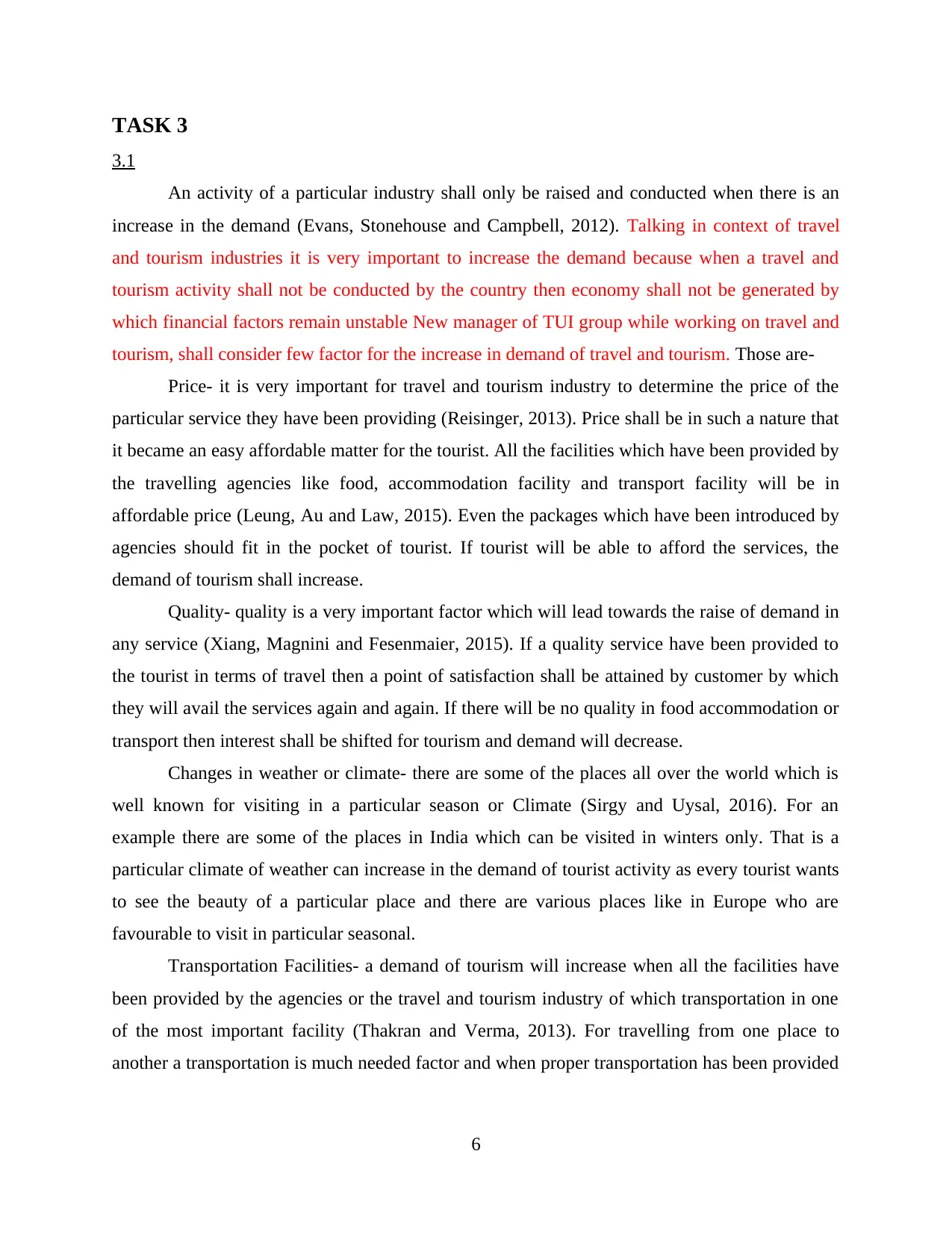
TASK 3
3.1
An activity of a particular industry shall only be raised and conducted when there is an
increase in the demand (Evans, Stonehouse and Campbell, 2012). Talking in context of travel
and tourism industries it is very important to increase the demand because when a travel and
tourism activity shall not be conducted by the country then economy shall not be generated by
which financial factors remain unstable New manager of TUI group while working on travel and
tourism, shall consider few factor for the increase in demand of travel and tourism. Those are-
Price- it is very important for travel and tourism industry to determine the price of the
particular service they have been providing (Reisinger, 2013). Price shall be in such a nature that
it became an easy affordable matter for the tourist. All the facilities which have been provided by
the travelling agencies like food, accommodation facility and transport facility will be in
affordable price (Leung, Au and Law, 2015). Even the packages which have been introduced by
agencies should fit in the pocket of tourist. If tourist will be able to afford the services, the
demand of tourism shall increase.
Quality- quality is a very important factor which will lead towards the raise of demand in
any service (Xiang, Magnini and Fesenmaier, 2015). If a quality service have been provided to
the tourist in terms of travel then a point of satisfaction shall be attained by customer by which
they will avail the services again and again. If there will be no quality in food accommodation or
transport then interest shall be shifted for tourism and demand will decrease.
Changes in weather or climate- there are some of the places all over the world which is
well known for visiting in a particular season or Climate (Sirgy and Uysal, 2016). For an
example there are some of the places in India which can be visited in winters only. That is a
particular climate of weather can increase in the demand of tourist activity as every tourist wants
to see the beauty of a particular place and there are various places like in Europe who are
favourable to visit in particular seasonal.
Transportation Facilities- a demand of tourism will increase when all the facilities have
been provided by the agencies or the travel and tourism industry of which transportation in one
of the most important facility (Thakran and Verma, 2013). For travelling from one place to
another a transportation is much needed factor and when proper transportation has been provided
6
3.1
An activity of a particular industry shall only be raised and conducted when there is an
increase in the demand (Evans, Stonehouse and Campbell, 2012). Talking in context of travel
and tourism industries it is very important to increase the demand because when a travel and
tourism activity shall not be conducted by the country then economy shall not be generated by
which financial factors remain unstable New manager of TUI group while working on travel and
tourism, shall consider few factor for the increase in demand of travel and tourism. Those are-
Price- it is very important for travel and tourism industry to determine the price of the
particular service they have been providing (Reisinger, 2013). Price shall be in such a nature that
it became an easy affordable matter for the tourist. All the facilities which have been provided by
the travelling agencies like food, accommodation facility and transport facility will be in
affordable price (Leung, Au and Law, 2015). Even the packages which have been introduced by
agencies should fit in the pocket of tourist. If tourist will be able to afford the services, the
demand of tourism shall increase.
Quality- quality is a very important factor which will lead towards the raise of demand in
any service (Xiang, Magnini and Fesenmaier, 2015). If a quality service have been provided to
the tourist in terms of travel then a point of satisfaction shall be attained by customer by which
they will avail the services again and again. If there will be no quality in food accommodation or
transport then interest shall be shifted for tourism and demand will decrease.
Changes in weather or climate- there are some of the places all over the world which is
well known for visiting in a particular season or Climate (Sirgy and Uysal, 2016). For an
example there are some of the places in India which can be visited in winters only. That is a
particular climate of weather can increase in the demand of tourist activity as every tourist wants
to see the beauty of a particular place and there are various places like in Europe who are
favourable to visit in particular seasonal.
Transportation Facilities- a demand of tourism will increase when all the facilities have
been provided by the agencies or the travel and tourism industry of which transportation in one
of the most important facility (Thakran and Verma, 2013). For travelling from one place to
another a transportation is much needed factor and when proper transportation has been provided
6
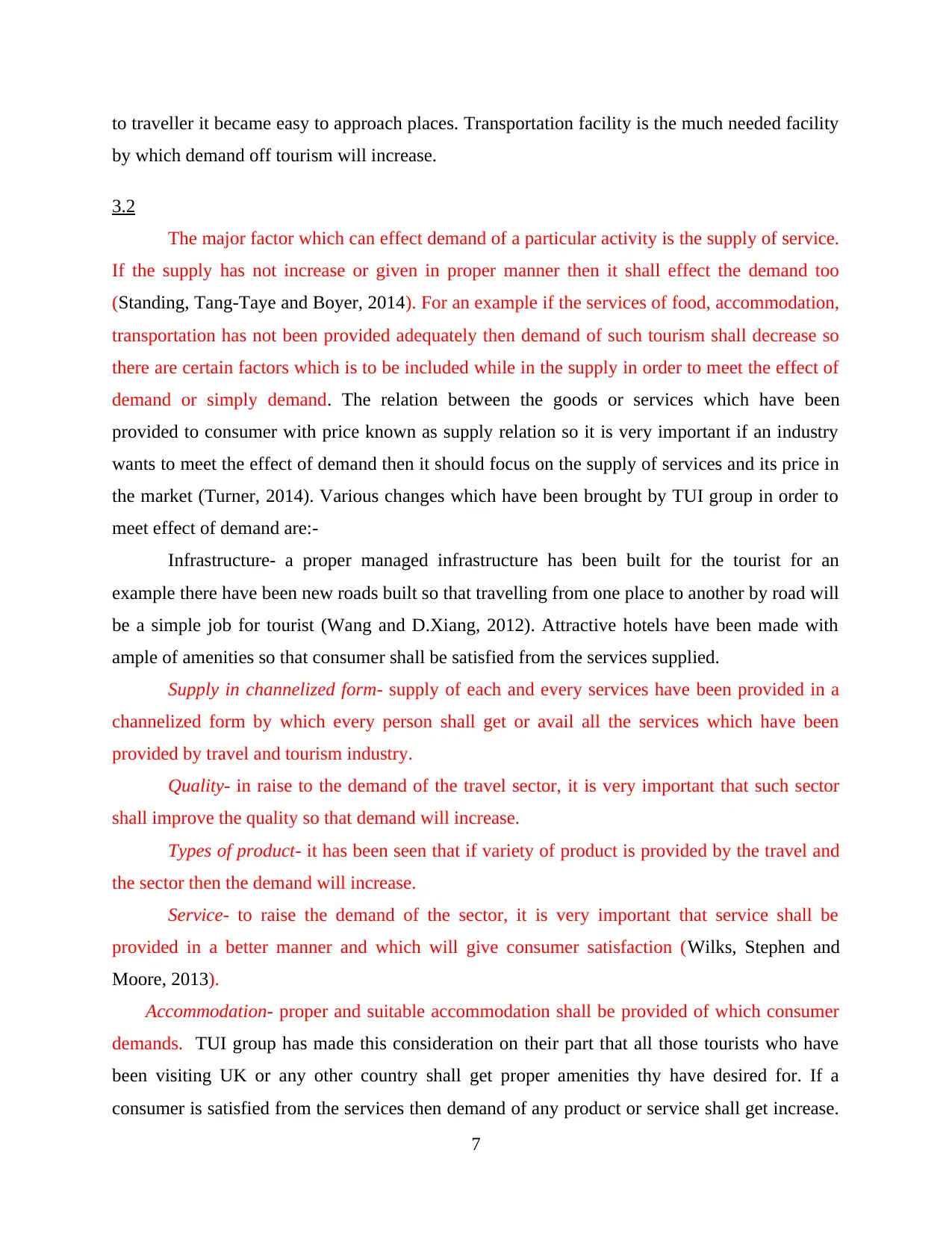
to traveller it became easy to approach places. Transportation facility is the much needed facility
by which demand off tourism will increase.
3.2
The major factor which can effect demand of a particular activity is the supply of service.
If the supply has not increase or given in proper manner then it shall effect the demand too
(Standing, Tang-Taye and Boyer, 2014). For an example if the services of food, accommodation,
transportation has not been provided adequately then demand of such tourism shall decrease so
there are certain factors which is to be included while in the supply in order to meet the effect of
demand or simply demand. The relation between the goods or services which have been
provided to consumer with price known as supply relation so it is very important if an industry
wants to meet the effect of demand then it should focus on the supply of services and its price in
the market (Turner, 2014). Various changes which have been brought by TUI group in order to
meet effect of demand are:-
Infrastructure- a proper managed infrastructure has been built for the tourist for an
example there have been new roads built so that travelling from one place to another by road will
be a simple job for tourist (Wang and D.Xiang, 2012). Attractive hotels have been made with
ample of amenities so that consumer shall be satisfied from the services supplied.
Supply in channelized form- supply of each and every services have been provided in a
channelized form by which every person shall get or avail all the services which have been
provided by travel and tourism industry.
Quality- in raise to the demand of the travel sector, it is very important that such sector
shall improve the quality so that demand will increase.
Types of product- it has been seen that if variety of product is provided by the travel and
the sector then the demand will increase.
Service- to raise the demand of the sector, it is very important that service shall be
provided in a better manner and which will give consumer satisfaction (Wilks, Stephen and
Moore, 2013).
Accommodation- proper and suitable accommodation shall be provided of which consumer
demands. TUI group has made this consideration on their part that all those tourists who have
been visiting UK or any other country shall get proper amenities thy have desired for. If a
consumer is satisfied from the services then demand of any product or service shall get increase.
7
by which demand off tourism will increase.
3.2
The major factor which can effect demand of a particular activity is the supply of service.
If the supply has not increase or given in proper manner then it shall effect the demand too
(Standing, Tang-Taye and Boyer, 2014). For an example if the services of food, accommodation,
transportation has not been provided adequately then demand of such tourism shall decrease so
there are certain factors which is to be included while in the supply in order to meet the effect of
demand or simply demand. The relation between the goods or services which have been
provided to consumer with price known as supply relation so it is very important if an industry
wants to meet the effect of demand then it should focus on the supply of services and its price in
the market (Turner, 2014). Various changes which have been brought by TUI group in order to
meet effect of demand are:-
Infrastructure- a proper managed infrastructure has been built for the tourist for an
example there have been new roads built so that travelling from one place to another by road will
be a simple job for tourist (Wang and D.Xiang, 2012). Attractive hotels have been made with
ample of amenities so that consumer shall be satisfied from the services supplied.
Supply in channelized form- supply of each and every services have been provided in a
channelized form by which every person shall get or avail all the services which have been
provided by travel and tourism industry.
Quality- in raise to the demand of the travel sector, it is very important that such sector
shall improve the quality so that demand will increase.
Types of product- it has been seen that if variety of product is provided by the travel and
the sector then the demand will increase.
Service- to raise the demand of the sector, it is very important that service shall be
provided in a better manner and which will give consumer satisfaction (Wilks, Stephen and
Moore, 2013).
Accommodation- proper and suitable accommodation shall be provided of which consumer
demands. TUI group has made this consideration on their part that all those tourists who have
been visiting UK or any other country shall get proper amenities thy have desired for. If a
consumer is satisfied from the services then demand of any product or service shall get increase.
7
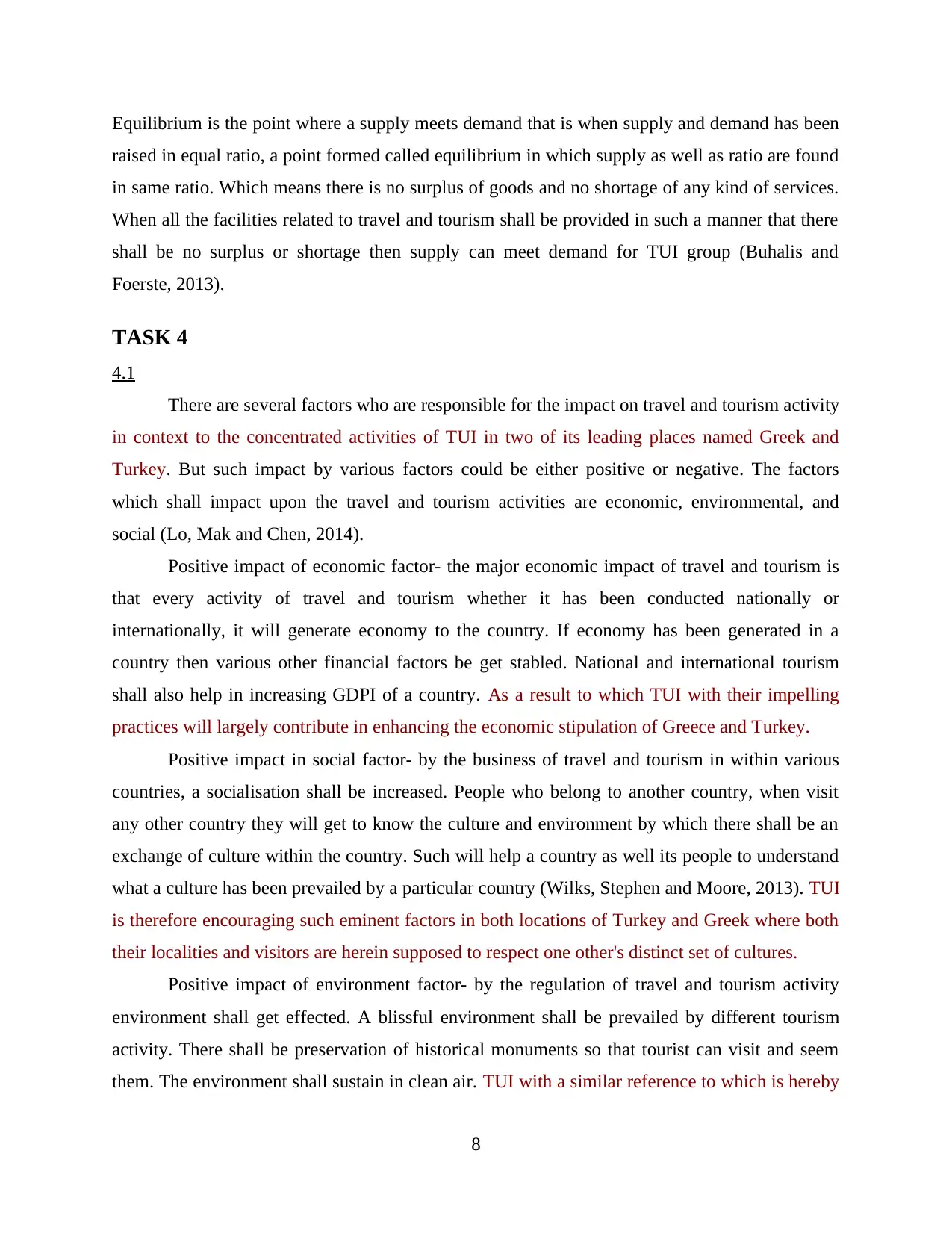
Equilibrium is the point where a supply meets demand that is when supply and demand has been
raised in equal ratio, a point formed called equilibrium in which supply as well as ratio are found
in same ratio. Which means there is no surplus of goods and no shortage of any kind of services.
When all the facilities related to travel and tourism shall be provided in such a manner that there
shall be no surplus or shortage then supply can meet demand for TUI group (Buhalis and
Foerste, 2013).
TASK 4
4.1
There are several factors who are responsible for the impact on travel and tourism activity
in context to the concentrated activities of TUI in two of its leading places named Greek and
Turkey. But such impact by various factors could be either positive or negative. The factors
which shall impact upon the travel and tourism activities are economic, environmental, and
social (Lo, Mak and Chen, 2014).
Positive impact of economic factor- the major economic impact of travel and tourism is
that every activity of travel and tourism whether it has been conducted nationally or
internationally, it will generate economy to the country. If economy has been generated in a
country then various other financial factors be get stabled. National and international tourism
shall also help in increasing GDPI of a country. As a result to which TUI with their impelling
practices will largely contribute in enhancing the economic stipulation of Greece and Turkey.
Positive impact in social factor- by the business of travel and tourism in within various
countries, a socialisation shall be increased. People who belong to another country, when visit
any other country they will get to know the culture and environment by which there shall be an
exchange of culture within the country. Such will help a country as well its people to understand
what a culture has been prevailed by a particular country (Wilks, Stephen and Moore, 2013). TUI
is therefore encouraging such eminent factors in both locations of Turkey and Greek where both
their localities and visitors are herein supposed to respect one other's distinct set of cultures.
Positive impact of environment factor- by the regulation of travel and tourism activity
environment shall get effected. A blissful environment shall be prevailed by different tourism
activity. There shall be preservation of historical monuments so that tourist can visit and seem
them. The environment shall sustain in clean air. TUI with a similar reference to which is hereby
8
raised in equal ratio, a point formed called equilibrium in which supply as well as ratio are found
in same ratio. Which means there is no surplus of goods and no shortage of any kind of services.
When all the facilities related to travel and tourism shall be provided in such a manner that there
shall be no surplus or shortage then supply can meet demand for TUI group (Buhalis and
Foerste, 2013).
TASK 4
4.1
There are several factors who are responsible for the impact on travel and tourism activity
in context to the concentrated activities of TUI in two of its leading places named Greek and
Turkey. But such impact by various factors could be either positive or negative. The factors
which shall impact upon the travel and tourism activities are economic, environmental, and
social (Lo, Mak and Chen, 2014).
Positive impact of economic factor- the major economic impact of travel and tourism is
that every activity of travel and tourism whether it has been conducted nationally or
internationally, it will generate economy to the country. If economy has been generated in a
country then various other financial factors be get stabled. National and international tourism
shall also help in increasing GDPI of a country. As a result to which TUI with their impelling
practices will largely contribute in enhancing the economic stipulation of Greece and Turkey.
Positive impact in social factor- by the business of travel and tourism in within various
countries, a socialisation shall be increased. People who belong to another country, when visit
any other country they will get to know the culture and environment by which there shall be an
exchange of culture within the country. Such will help a country as well its people to understand
what a culture has been prevailed by a particular country (Wilks, Stephen and Moore, 2013). TUI
is therefore encouraging such eminent factors in both locations of Turkey and Greek where both
their localities and visitors are herein supposed to respect one other's distinct set of cultures.
Positive impact of environment factor- by the regulation of travel and tourism activity
environment shall get effected. A blissful environment shall be prevailed by different tourism
activity. There shall be preservation of historical monuments so that tourist can visit and seem
them. The environment shall sustain in clean air. TUI with a similar reference to which is hereby
8
Secure Best Marks with AI Grader
Need help grading? Try our AI Grader for instant feedback on your assignments.
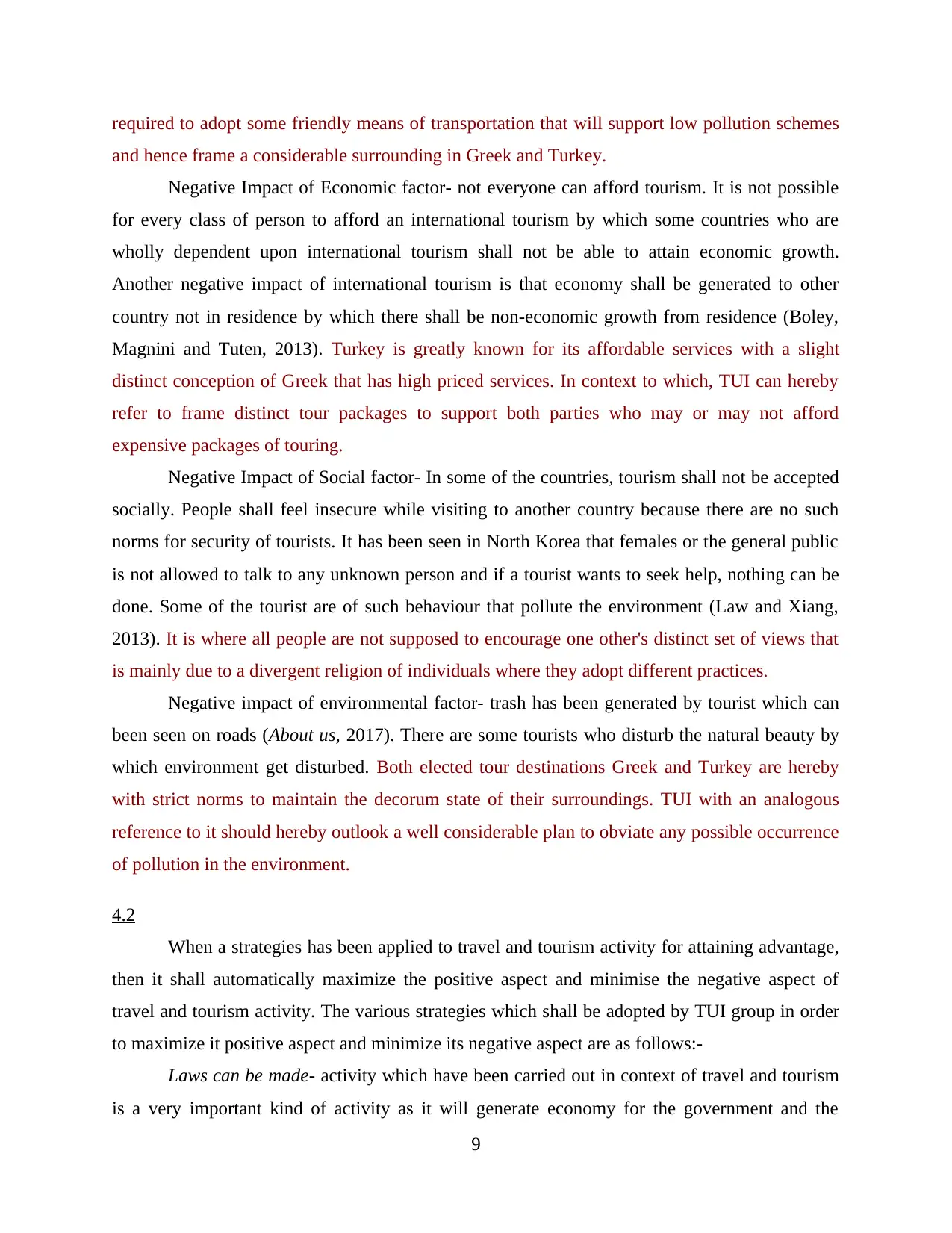
required to adopt some friendly means of transportation that will support low pollution schemes
and hence frame a considerable surrounding in Greek and Turkey.
Negative Impact of Economic factor- not everyone can afford tourism. It is not possible
for every class of person to afford an international tourism by which some countries who are
wholly dependent upon international tourism shall not be able to attain economic growth.
Another negative impact of international tourism is that economy shall be generated to other
country not in residence by which there shall be non-economic growth from residence (Boley,
Magnini and Tuten, 2013). Turkey is greatly known for its affordable services with a slight
distinct conception of Greek that has high priced services. In context to which, TUI can hereby
refer to frame distinct tour packages to support both parties who may or may not afford
expensive packages of touring.
Negative Impact of Social factor- In some of the countries, tourism shall not be accepted
socially. People shall feel insecure while visiting to another country because there are no such
norms for security of tourists. It has been seen in North Korea that females or the general public
is not allowed to talk to any unknown person and if a tourist wants to seek help, nothing can be
done. Some of the tourist are of such behaviour that pollute the environment (Law and Xiang,
2013). It is where all people are not supposed to encourage one other's distinct set of views that
is mainly due to a divergent religion of individuals where they adopt different practices.
Negative impact of environmental factor- trash has been generated by tourist which can
been seen on roads (About us, 2017). There are some tourists who disturb the natural beauty by
which environment get disturbed. Both elected tour destinations Greek and Turkey are hereby
with strict norms to maintain the decorum state of their surroundings. TUI with an analogous
reference to it should hereby outlook a well considerable plan to obviate any possible occurrence
of pollution in the environment.
4.2
When a strategies has been applied to travel and tourism activity for attaining advantage,
then it shall automatically maximize the positive aspect and minimise the negative aspect of
travel and tourism activity. The various strategies which shall be adopted by TUI group in order
to maximize it positive aspect and minimize its negative aspect are as follows:-
Laws can be made- activity which have been carried out in context of travel and tourism
is a very important kind of activity as it will generate economy for the government and the
9
and hence frame a considerable surrounding in Greek and Turkey.
Negative Impact of Economic factor- not everyone can afford tourism. It is not possible
for every class of person to afford an international tourism by which some countries who are
wholly dependent upon international tourism shall not be able to attain economic growth.
Another negative impact of international tourism is that economy shall be generated to other
country not in residence by which there shall be non-economic growth from residence (Boley,
Magnini and Tuten, 2013). Turkey is greatly known for its affordable services with a slight
distinct conception of Greek that has high priced services. In context to which, TUI can hereby
refer to frame distinct tour packages to support both parties who may or may not afford
expensive packages of touring.
Negative Impact of Social factor- In some of the countries, tourism shall not be accepted
socially. People shall feel insecure while visiting to another country because there are no such
norms for security of tourists. It has been seen in North Korea that females or the general public
is not allowed to talk to any unknown person and if a tourist wants to seek help, nothing can be
done. Some of the tourist are of such behaviour that pollute the environment (Law and Xiang,
2013). It is where all people are not supposed to encourage one other's distinct set of views that
is mainly due to a divergent religion of individuals where they adopt different practices.
Negative impact of environmental factor- trash has been generated by tourist which can
been seen on roads (About us, 2017). There are some tourists who disturb the natural beauty by
which environment get disturbed. Both elected tour destinations Greek and Turkey are hereby
with strict norms to maintain the decorum state of their surroundings. TUI with an analogous
reference to it should hereby outlook a well considerable plan to obviate any possible occurrence
of pollution in the environment.
4.2
When a strategies has been applied to travel and tourism activity for attaining advantage,
then it shall automatically maximize the positive aspect and minimise the negative aspect of
travel and tourism activity. The various strategies which shall be adopted by TUI group in order
to maximize it positive aspect and minimize its negative aspect are as follows:-
Laws can be made- activity which have been carried out in context of travel and tourism
is a very important kind of activity as it will generate economy for the government and the
9
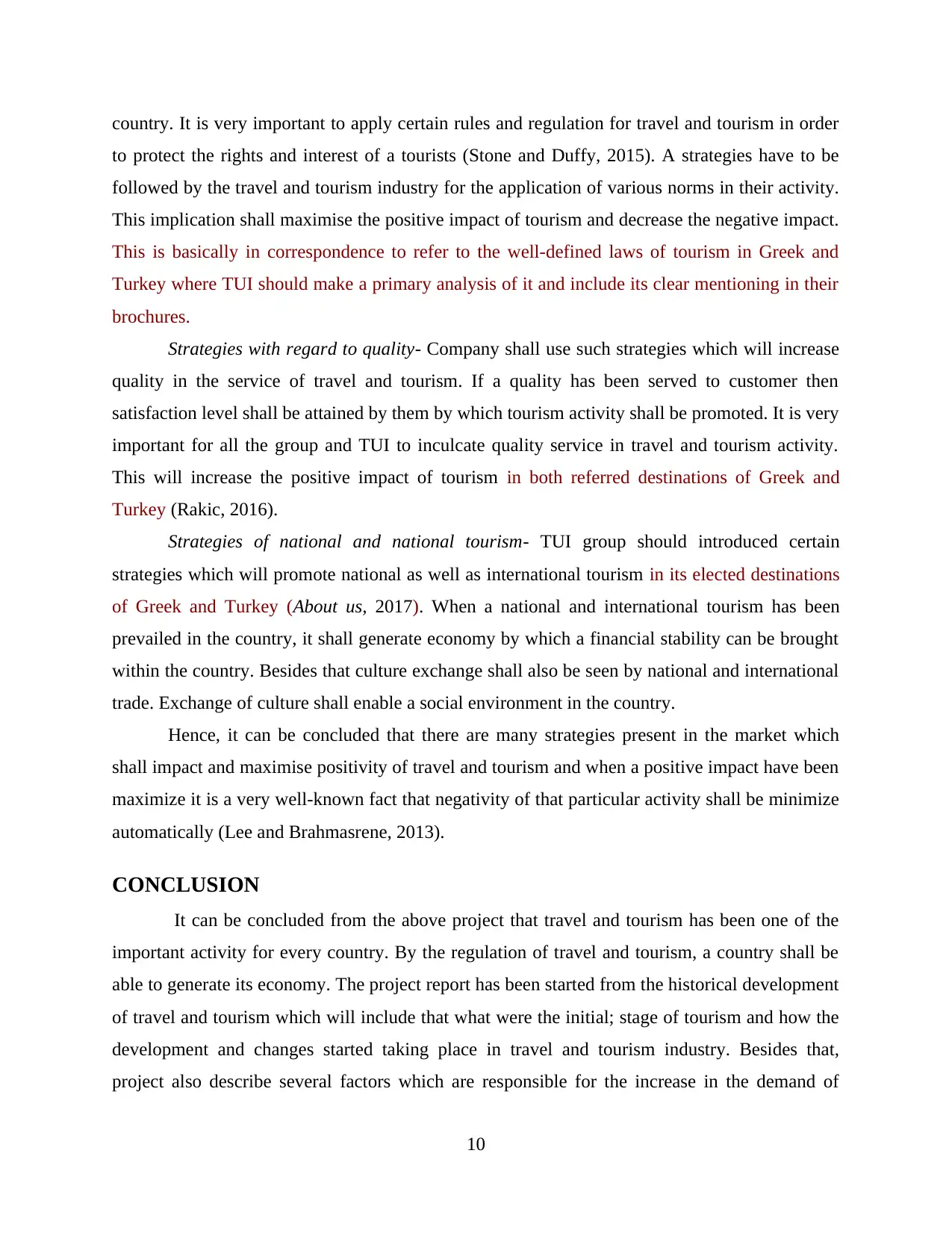
country. It is very important to apply certain rules and regulation for travel and tourism in order
to protect the rights and interest of a tourists (Stone and Duffy, 2015). A strategies have to be
followed by the travel and tourism industry for the application of various norms in their activity.
This implication shall maximise the positive impact of tourism and decrease the negative impact.
This is basically in correspondence to refer to the well-defined laws of tourism in Greek and
Turkey where TUI should make a primary analysis of it and include its clear mentioning in their
brochures.
Strategies with regard to quality- Company shall use such strategies which will increase
quality in the service of travel and tourism. If a quality has been served to customer then
satisfaction level shall be attained by them by which tourism activity shall be promoted. It is very
important for all the group and TUI to inculcate quality service in travel and tourism activity.
This will increase the positive impact of tourism in both referred destinations of Greek and
Turkey (Rakic, 2016).
Strategies of national and national tourism- TUI group should introduced certain
strategies which will promote national as well as international tourism in its elected destinations
of Greek and Turkey (About us, 2017). When a national and international tourism has been
prevailed in the country, it shall generate economy by which a financial stability can be brought
within the country. Besides that culture exchange shall also be seen by national and international
trade. Exchange of culture shall enable a social environment in the country.
Hence, it can be concluded that there are many strategies present in the market which
shall impact and maximise positivity of travel and tourism and when a positive impact have been
maximize it is a very well-known fact that negativity of that particular activity shall be minimize
automatically (Lee and Brahmasrene, 2013).
CONCLUSION
It can be concluded from the above project that travel and tourism has been one of the
important activity for every country. By the regulation of travel and tourism, a country shall be
able to generate its economy. The project report has been started from the historical development
of travel and tourism which will include that what were the initial; stage of tourism and how the
development and changes started taking place in travel and tourism industry. Besides that,
project also describe several factors which are responsible for the increase in the demand of
10
to protect the rights and interest of a tourists (Stone and Duffy, 2015). A strategies have to be
followed by the travel and tourism industry for the application of various norms in their activity.
This implication shall maximise the positive impact of tourism and decrease the negative impact.
This is basically in correspondence to refer to the well-defined laws of tourism in Greek and
Turkey where TUI should make a primary analysis of it and include its clear mentioning in their
brochures.
Strategies with regard to quality- Company shall use such strategies which will increase
quality in the service of travel and tourism. If a quality has been served to customer then
satisfaction level shall be attained by them by which tourism activity shall be promoted. It is very
important for all the group and TUI to inculcate quality service in travel and tourism activity.
This will increase the positive impact of tourism in both referred destinations of Greek and
Turkey (Rakic, 2016).
Strategies of national and national tourism- TUI group should introduced certain
strategies which will promote national as well as international tourism in its elected destinations
of Greek and Turkey (About us, 2017). When a national and international tourism has been
prevailed in the country, it shall generate economy by which a financial stability can be brought
within the country. Besides that culture exchange shall also be seen by national and international
trade. Exchange of culture shall enable a social environment in the country.
Hence, it can be concluded that there are many strategies present in the market which
shall impact and maximise positivity of travel and tourism and when a positive impact have been
maximize it is a very well-known fact that negativity of that particular activity shall be minimize
automatically (Lee and Brahmasrene, 2013).
CONCLUSION
It can be concluded from the above project that travel and tourism has been one of the
important activity for every country. By the regulation of travel and tourism, a country shall be
able to generate its economy. The project report has been started from the historical development
of travel and tourism which will include that what were the initial; stage of tourism and how the
development and changes started taking place in travel and tourism industry. Besides that,
project also describe several factors which are responsible for the increase in the demand of
10
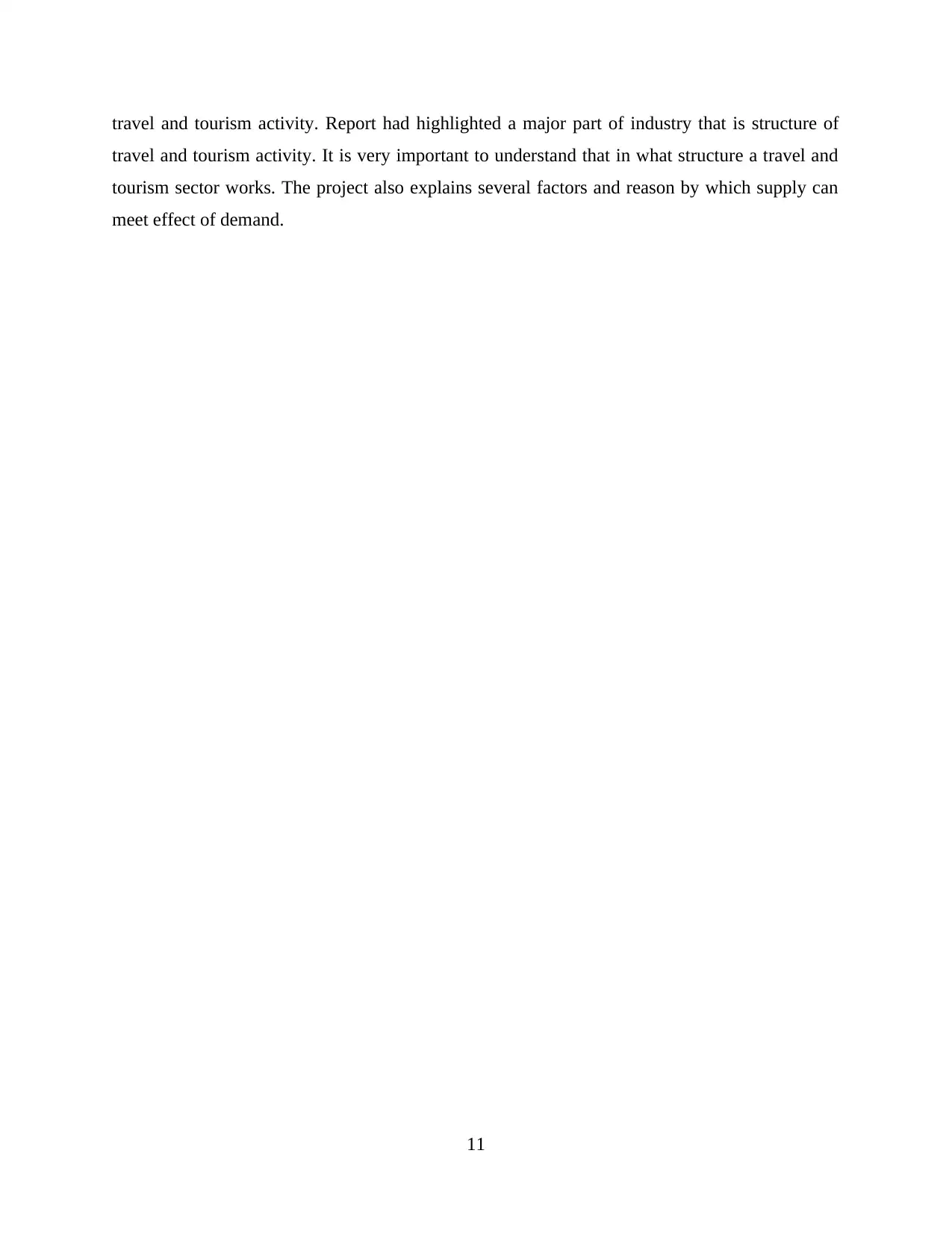
travel and tourism activity. Report had highlighted a major part of industry that is structure of
travel and tourism activity. It is very important to understand that in what structure a travel and
tourism sector works. The project also explains several factors and reason by which supply can
meet effect of demand.
11
travel and tourism activity. It is very important to understand that in what structure a travel and
tourism sector works. The project also explains several factors and reason by which supply can
meet effect of demand.
11
Paraphrase This Document
Need a fresh take? Get an instant paraphrase of this document with our AI Paraphraser
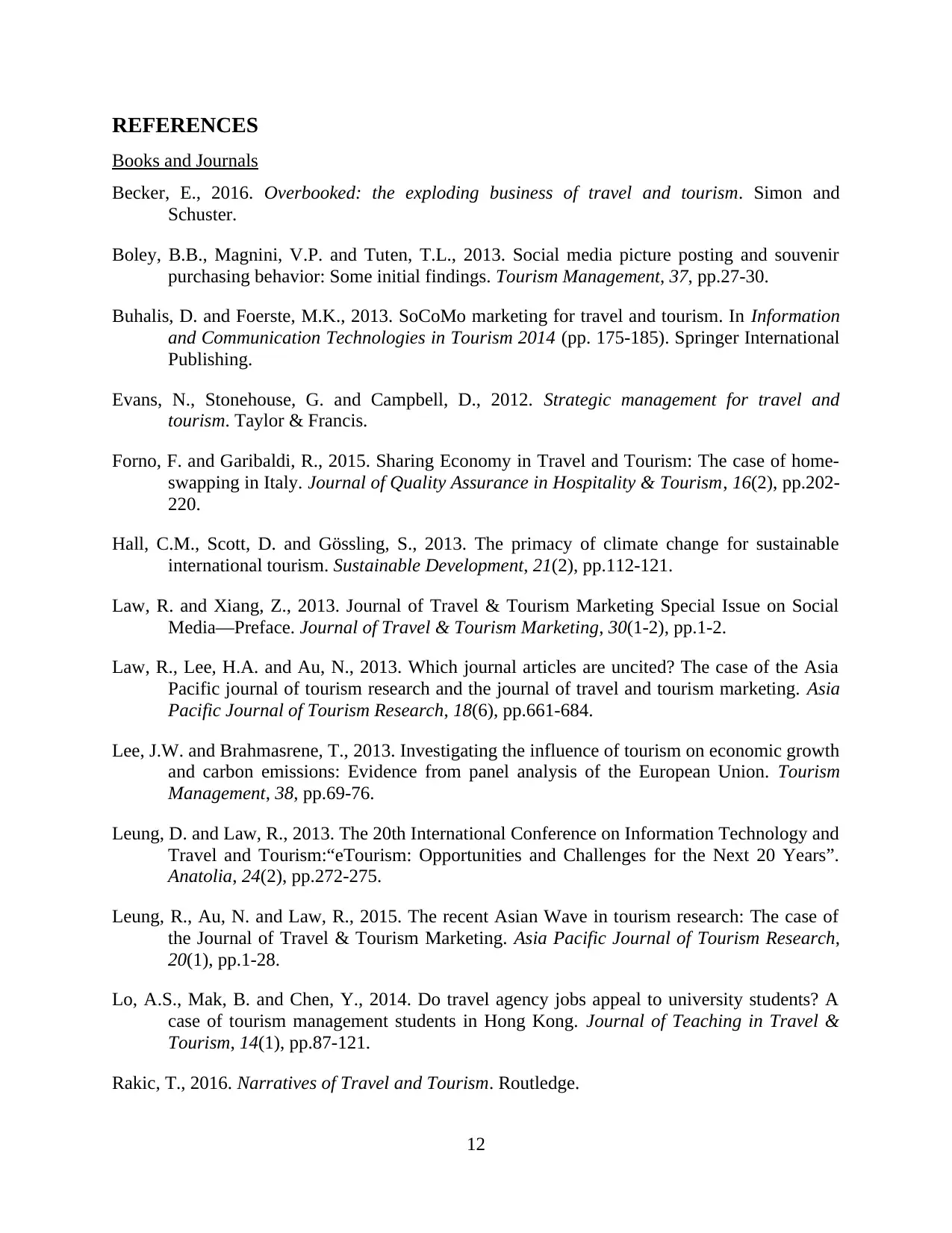
REFERENCES
Books and Journals
Becker, E., 2016. Overbooked: the exploding business of travel and tourism. Simon and
Schuster.
Boley, B.B., Magnini, V.P. and Tuten, T.L., 2013. Social media picture posting and souvenir
purchasing behavior: Some initial findings. Tourism Management, 37, pp.27-30.
Buhalis, D. and Foerste, M.K., 2013. SoCoMo marketing for travel and tourism. In Information
and Communication Technologies in Tourism 2014 (pp. 175-185). Springer International
Publishing.
Evans, N., Stonehouse, G. and Campbell, D., 2012. Strategic management for travel and
tourism. Taylor & Francis.
Forno, F. and Garibaldi, R., 2015. Sharing Economy in Travel and Tourism: The case of home-
swapping in Italy. Journal of Quality Assurance in Hospitality & Tourism, 16(2), pp.202-
220.
Hall, C.M., Scott, D. and Gössling, S., 2013. The primacy of climate change for sustainable
international tourism. Sustainable Development, 21(2), pp.112-121.
Law, R. and Xiang, Z., 2013. Journal of Travel & Tourism Marketing Special Issue on Social
Media—Preface. Journal of Travel & Tourism Marketing, 30(1-2), pp.1-2.
Law, R., Lee, H.A. and Au, N., 2013. Which journal articles are uncited? The case of the Asia
Pacific journal of tourism research and the journal of travel and tourism marketing. Asia
Pacific Journal of Tourism Research, 18(6), pp.661-684.
Lee, J.W. and Brahmasrene, T., 2013. Investigating the influence of tourism on economic growth
and carbon emissions: Evidence from panel analysis of the European Union. Tourism
Management, 38, pp.69-76.
Leung, D. and Law, R., 2013. The 20th International Conference on Information Technology and
Travel and Tourism:“eTourism: Opportunities and Challenges for the Next 20 Years”.
Anatolia, 24(2), pp.272-275.
Leung, R., Au, N. and Law, R., 2015. The recent Asian Wave in tourism research: The case of
the Journal of Travel & Tourism Marketing. Asia Pacific Journal of Tourism Research,
20(1), pp.1-28.
Lo, A.S., Mak, B. and Chen, Y., 2014. Do travel agency jobs appeal to university students? A
case of tourism management students in Hong Kong. Journal of Teaching in Travel &
Tourism, 14(1), pp.87-121.
Rakic, T., 2016. Narratives of Travel and Tourism. Routledge.
12
Books and Journals
Becker, E., 2016. Overbooked: the exploding business of travel and tourism. Simon and
Schuster.
Boley, B.B., Magnini, V.P. and Tuten, T.L., 2013. Social media picture posting and souvenir
purchasing behavior: Some initial findings. Tourism Management, 37, pp.27-30.
Buhalis, D. and Foerste, M.K., 2013. SoCoMo marketing for travel and tourism. In Information
and Communication Technologies in Tourism 2014 (pp. 175-185). Springer International
Publishing.
Evans, N., Stonehouse, G. and Campbell, D., 2012. Strategic management for travel and
tourism. Taylor & Francis.
Forno, F. and Garibaldi, R., 2015. Sharing Economy in Travel and Tourism: The case of home-
swapping in Italy. Journal of Quality Assurance in Hospitality & Tourism, 16(2), pp.202-
220.
Hall, C.M., Scott, D. and Gössling, S., 2013. The primacy of climate change for sustainable
international tourism. Sustainable Development, 21(2), pp.112-121.
Law, R. and Xiang, Z., 2013. Journal of Travel & Tourism Marketing Special Issue on Social
Media—Preface. Journal of Travel & Tourism Marketing, 30(1-2), pp.1-2.
Law, R., Lee, H.A. and Au, N., 2013. Which journal articles are uncited? The case of the Asia
Pacific journal of tourism research and the journal of travel and tourism marketing. Asia
Pacific Journal of Tourism Research, 18(6), pp.661-684.
Lee, J.W. and Brahmasrene, T., 2013. Investigating the influence of tourism on economic growth
and carbon emissions: Evidence from panel analysis of the European Union. Tourism
Management, 38, pp.69-76.
Leung, D. and Law, R., 2013. The 20th International Conference on Information Technology and
Travel and Tourism:“eTourism: Opportunities and Challenges for the Next 20 Years”.
Anatolia, 24(2), pp.272-275.
Leung, R., Au, N. and Law, R., 2015. The recent Asian Wave in tourism research: The case of
the Journal of Travel & Tourism Marketing. Asia Pacific Journal of Tourism Research,
20(1), pp.1-28.
Lo, A.S., Mak, B. and Chen, Y., 2014. Do travel agency jobs appeal to university students? A
case of tourism management students in Hong Kong. Journal of Teaching in Travel &
Tourism, 14(1), pp.87-121.
Rakic, T., 2016. Narratives of Travel and Tourism. Routledge.
12
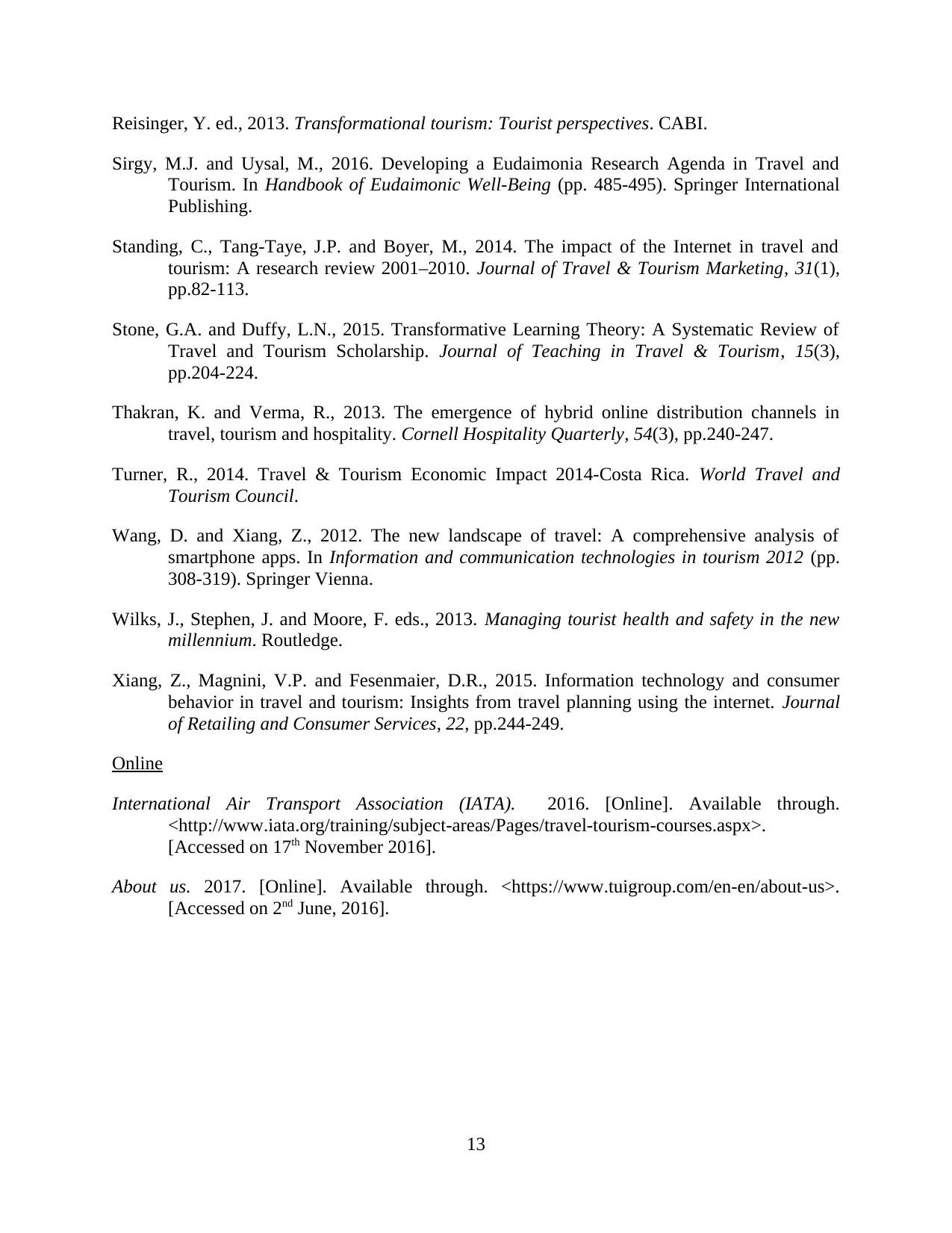
Reisinger, Y. ed., 2013. Transformational tourism: Tourist perspectives. CABI.
Sirgy, M.J. and Uysal, M., 2016. Developing a Eudaimonia Research Agenda in Travel and
Tourism. In Handbook of Eudaimonic Well-Being (pp. 485-495). Springer International
Publishing.
Standing, C., Tang-Taye, J.P. and Boyer, M., 2014. The impact of the Internet in travel and
tourism: A research review 2001–2010. Journal of Travel & Tourism Marketing, 31(1),
pp.82-113.
Stone, G.A. and Duffy, L.N., 2015. Transformative Learning Theory: A Systematic Review of
Travel and Tourism Scholarship. Journal of Teaching in Travel & Tourism, 15(3),
pp.204-224.
Thakran, K. and Verma, R., 2013. The emergence of hybrid online distribution channels in
travel, tourism and hospitality. Cornell Hospitality Quarterly, 54(3), pp.240-247.
Turner, R., 2014. Travel & Tourism Economic Impact 2014-Costa Rica. World Travel and
Tourism Council.
Wang, D. and Xiang, Z., 2012. The new landscape of travel: A comprehensive analysis of
smartphone apps. In Information and communication technologies in tourism 2012 (pp.
308-319). Springer Vienna.
Wilks, J., Stephen, J. and Moore, F. eds., 2013. Managing tourist health and safety in the new
millennium. Routledge.
Xiang, Z., Magnini, V.P. and Fesenmaier, D.R., 2015. Information technology and consumer
behavior in travel and tourism: Insights from travel planning using the internet. Journal
of Retailing and Consumer Services, 22, pp.244-249.
Online
International Air Transport Association (IATA). 2016. [Online]. Available through.
<http://www.iata.org/training/subject-areas/Pages/travel-tourism-courses.aspx>.
[Accessed on 17th November 2016].
About us. 2017. [Online]. Available through. <https://www.tuigroup.com/en-en/about-us>.
[Accessed on 2nd June, 2016].
13
Sirgy, M.J. and Uysal, M., 2016. Developing a Eudaimonia Research Agenda in Travel and
Tourism. In Handbook of Eudaimonic Well-Being (pp. 485-495). Springer International
Publishing.
Standing, C., Tang-Taye, J.P. and Boyer, M., 2014. The impact of the Internet in travel and
tourism: A research review 2001–2010. Journal of Travel & Tourism Marketing, 31(1),
pp.82-113.
Stone, G.A. and Duffy, L.N., 2015. Transformative Learning Theory: A Systematic Review of
Travel and Tourism Scholarship. Journal of Teaching in Travel & Tourism, 15(3),
pp.204-224.
Thakran, K. and Verma, R., 2013. The emergence of hybrid online distribution channels in
travel, tourism and hospitality. Cornell Hospitality Quarterly, 54(3), pp.240-247.
Turner, R., 2014. Travel & Tourism Economic Impact 2014-Costa Rica. World Travel and
Tourism Council.
Wang, D. and Xiang, Z., 2012. The new landscape of travel: A comprehensive analysis of
smartphone apps. In Information and communication technologies in tourism 2012 (pp.
308-319). Springer Vienna.
Wilks, J., Stephen, J. and Moore, F. eds., 2013. Managing tourist health and safety in the new
millennium. Routledge.
Xiang, Z., Magnini, V.P. and Fesenmaier, D.R., 2015. Information technology and consumer
behavior in travel and tourism: Insights from travel planning using the internet. Journal
of Retailing and Consumer Services, 22, pp.244-249.
Online
International Air Transport Association (IATA). 2016. [Online]. Available through.
<http://www.iata.org/training/subject-areas/Pages/travel-tourism-courses.aspx>.
[Accessed on 17th November 2016].
About us. 2017. [Online]. Available through. <https://www.tuigroup.com/en-en/about-us>.
[Accessed on 2nd June, 2016].
13

\
14
14
1 out of 16
Related Documents
Your All-in-One AI-Powered Toolkit for Academic Success.
+13062052269
info@desklib.com
Available 24*7 on WhatsApp / Email
![[object Object]](/_next/static/media/star-bottom.7253800d.svg)
Unlock your academic potential
© 2024 | Zucol Services PVT LTD | All rights reserved.





